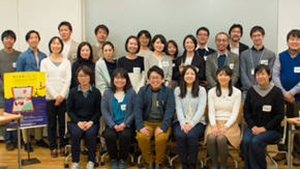Creating an Environment (Getting to Know Each Other & 1-min Research Presentation) / Present Situation of Higher Education
・Goals and Objectives
・Icebreaker (Introducing a Participant to Another)
・1-min Research Presentation (Group Activity and Exchanging Feedback)
・Present Situation of Higher Education
・Reflection
Participants were waiting for the first class to start, sitting without conversation in a somewhat tense atmosphere, perhaps because almost no one had friends in the classroom and they had been given a pre-assignment to prepare a 1-min presentation in front of the class.
I was worried if group activities would work in such a mood, but once they had an icebreaker 20 minutes after the class started, the atmosphere drastically changed into a relaxed one, and they engaged in the following 1-min research presentations, attentively listening to others and actively discussing and giving feedback in groups. They were completely getting along with each other by the end of the class.
I think participants came to be able to learn from each other as fellows by the instructor repeating the keyword “fellows” when explaining the goal of the class, “To set a clear goal of learning at UTokyo FFP by getting to know other fellows that you will be learning with,” and the objective, “To remember five or more names of your fellows,” in the beginning. The carefully designed class structure of gradually and smoothly developing simple activities into complicated ones was also effective; the class started by involving the participants with closed questions (i.e., questions with fixed answers like “Yes” or “No”), which are easy to answer, and gradually moved on to more complex activities such as an icebreaker (i.e, introducing another participant to someone else) and giving feedback in groups.
“1-min research presentation,” the main topic of the session, can be applied to real classes to “gain students’ trust by expressing the values and charms of the instructor’s research.” It became a precious opportunity for the participants to practice their presentation skills by receiving feedback on their presentations from the instructor and other participants, filming their presentations as an assignment, and reflecting on those videos by themselves. The instructor gave the following feedback to the whole class: “Even if you speak perfectly like an anchor, you cannot make the listeners understand the charms of your research.” It made me realize that, in classes, it is important for the instructors to create an environment where students can learn without feeling insecure by revealing themselves instead of trying to speak perfectly.




















